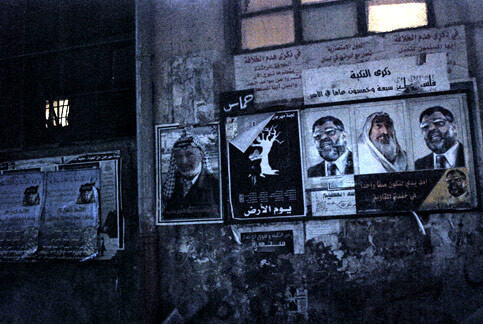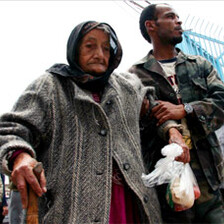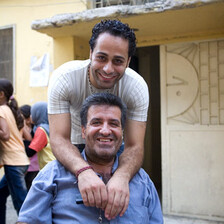Baddawi Refugee Camp 28 May 2007

Posters of assassinated Hamas leaders and Yasser Arafat on a Bedawi Refugee Camp wall. (Tanya Traboulsi)
26 May 2007
Bedawi is teeming with new arrivals from Nahr al-Bared where there is still no water, power or food. A few NGOs are still negotiating with the army for permission to enter. (Still possible to sneak in from the east but getting more dangerous to try it.) The problem is not being shot by Fatah al-Islam anymore. They are digging in. And the army is not as trigger happy as it was Monday through Wednesday. The “security agents” on the slopes above the army looking down into al-Bared are the main sniper danger. People claim they are Hariri militia but I cannot confirm that. The army told the PLO they would stop them but as of Saturday night they are still shooting. They are trying to shoot anyone they see inside or leaving al-Bared. Someone should stop them.
Several hours ago I met a woman arriving from al-Bared who had walked the whole seven miles with an 18-month-old baby and a daughter of five who just stares into the press cameras with her mouth open and eyes glazed over. The Palestinian mother told us neither she nor her children have eaten or taken water for four days. The children will be OK. The mother’s husband is in Syria she said and she has no relatives.
One old Mercedes arrives with 18 people in it — seven adults and 11 children. People cheered their achievement.
One NGO group of three organizations from Beirut left a few hours ago in tears from frustration, sadness and anger from repeatedly being stopped by the army from taking supplies to al-Bared. Their cargo of water and blankets was abandoned. On Saturday the Palestinian Red Crescent, which for a quarter century has provided medical service to both camps has been formally and completely banned from al-Bared and told they will be shot if they try to enter al-Bared. I met with the PRCS leadership and drivers.
There is some near panic in Bedawi caused by many rumors. One rumor, widely believed, is that the Lebanese government plans to demolish al-Bared to make room for the huge US/NATO air base which is to be built next to the camp. Five thousand of the Palestinians in al-Bared are from the 1975 ethnically cleansed east Beirut camp Tel al-Zater. The PLO moved them to al-Bared at the beginning of the Lebanese civil war (1975-90) and they live close together in one al-Bared neighborhood. Saw women wailing that there may be another Tel al-Zater massacre and destruction of their homes.
Many young Palestinian men are being arrested as they leave al-Bared. An old woman sleeping in the same room as me last night told us that her son was taken as he left al-Bared on Monday and she has not heard from him.
There are now six checkpoints between Tripoli and Beirut. Some Palestinian males traveling to Beirut are being arrested and taken for interrogation. Some from al-Bared are afraid to try to go to Beirut and stay with relatives. But some from al-Bared are moving to other camps as far south as Ain al-Helwe in Sidon. Fifty families or so have arrived in Shatilla and about 30 in Burj al-Baraneh.
There is a fear among PLO camp leaders that there could be a blood bath. “It’s the Bush complex,” one German NGO volunteer said. “The Lebanese government wants to be macho like the Israelis to gain some respect. This could be another Waco in the making, for no reason.” The PLO is trying to mediate with the army to avoid a slaughter that would surely occur if the army tries to enter al-Bared. “What is needed is leadership and for the warlords to keep quiet. The army has behaved very badly but it’s the politicians’ fault.”
Fear that the army will try to enter al-Bared
The army moved the press position to more than one mile from al-Bared, “for security”. The army has orders to give no information to the press. Some journalists feel something terrible is going to happen here. Just heard the army has now completely sealed the camp. There’s no access to the wounded still in basements and bombed houses needing help. Palestinians activists in Bedawi say that if the army goes into al-Bared and makes a massacre Palestinians from all over Lebanon will fight. This may be what some here or outside Lebanon are hoping for.
Not one Palestinian in either camp or observer I know believes that the goal is for the army “wipe out the terrorists”, and “protect our Palestinian brothers”. Rather the Palestinian community in Lebanon believes that the whole Fatah al-Islam “very strange case” was designed to assault their 420,000 population here.
The academic year is canceled in Bedawi because up to 20,000 from al-Bared are being housed in the schools. Food and water are arriving intermittently but distribution is not yet well organized. There is much angst among the arrivals who come with only what they are wearing.
Joy to find al-Bared loved ones — statements are heard on the crowded streets such as, “Why did the army fire on us? There were no fighters in our area,” “Where was their artillery during the July war? Why did they not fight Israel and now bomb us?”
The leader of Nahr al-Bared women’s association accused Lebanon’s envoy Abbas Zaki of not helping the refugees and with cooperating with the government and Israel. “He should come here”, one woman said. “Abu Ammar or Abu Jihad [Yasser Arafat and his deputy Khalil al-Wazir] would have come if they were alive”. Fatah is weak in Bedawi and even weaker in al-Bared.
Seven PLO factions operate in both camps. They jointly chased Fatah al-Islam out of Bedawi on 21 September 2006 not long after they split from Abu Musa’s Fateh Intifida which has been based in Badawi since 1983. Fatah Intifada still mans the entrance to Bedawi but they seem to have only about 100 members left. When one interviews them they are almost apologetic about their step-brothers, Fatah al-Islam. (“We expelled them because we did not like their friends [Hariri intelligence staff]; they were too religious and acted strange but we did not think things would come to this”.) But the al-Bared PLO factions do not have arms or power to confront FAI.
Amazing examples of humanity are happening here. There are many family connections between the two camps. Kids distribute water and bread when it arrives in cars from Beirut and elsewhere. Young girls pick up and care for babies of people they don’t know, helping old people find a place to sit and listen to them when they tell of what happened. I could be wrong but I have rarely witnessed solidarity among people as I see here with the Palestinians. Smart, patient, charming, funny, and caring toward one another — determined to return to Palestine.
Many who have been in Badawi for nearly a week now say they just want to go back and die in their al-Bared homes. On 25 May 2007 the Palestinian group, the Democratic Front for the Liberation of Palestine tried to organize a convoy of those who wanted to return to al-Bared. The plan is to go as far as they can and refuse to leave the army checkpoints until they are allowed back in. The convoy did not leave Bedawi yet and the idea may be abandoned.
Franklin Lamb’s just released book, The Price We Pay: A Quarter Century of Israel’s Use of American Weapons in Lebanon is available at Amazon.com.uk. His volume, Hezbollah: a Brief Guide for Beginners is due out in early summer 2007. He can be reached at fplamb at gmail.com.
Related Links



